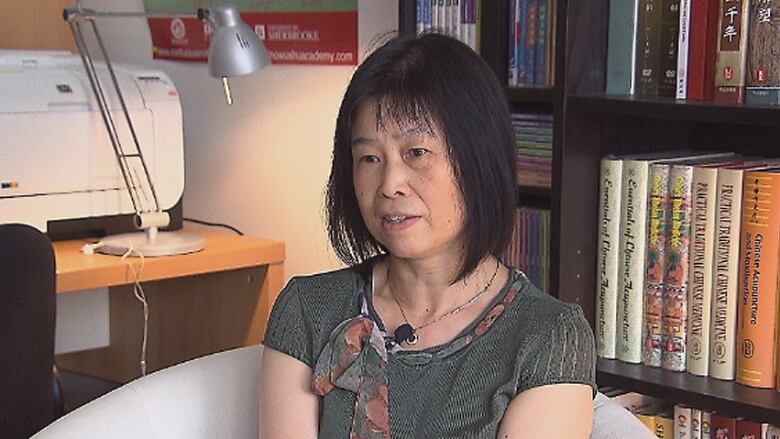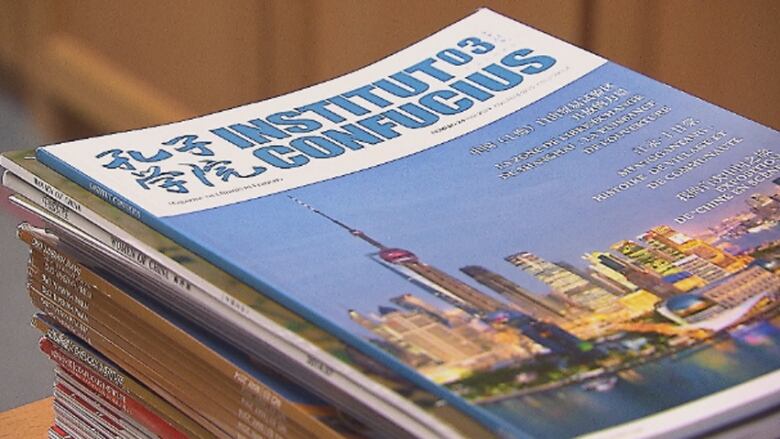Local Chinese school visited by CSIS, director says
Meng Rong of Confucius Institute in Quebec says schools have no link to spying or politics

Agents of the Canadian Security Intelligence Service have attempted to speak to the director of a Chinese language school located at Dawson College in Montreal on three different occasions, MengRong told CBC Montreal in an exclusive interview.
- SPECIAL REPORT|Dawson College to renew ties to controversial Chinese school
- More from CBC News Investigates
"We told them very clearly, (the school) has nothing to do with politics or spying," saidRong, who heads the Confucius Institute in Quebec.
Dawson College signed an agreement with the Chinese government andUniversitdeSherbrooketo house the Confucius school in 2007.
Rongsaid CSIS agents first interrogated her on the day of the opening ceremony itself, attended by JeanCharestwho was the Quebec premier at the time.
She said they didn't stop there.
"They came to my home, which is not right," she said.Rongwas shown a list of names, and asked if she could identify anybody.
She said besides obvious ones, like Canada's ambassador to Chinano names stood out.
In 2008, she saidCSISvisited her again, but left her alone after she threatened to file a humanrights complaint.
Watched by CSIS
We are sitting at all the major tables, like NORAD,G20,G8, NATO. We have our secrets, we have our friends' secrets as well.- FormerCSISAsia-Pacific Bureau Chief Michel-JuneauKatsuya
The language schools are partly funded by the Chinese government and typically set up on campus grounds at universities which sign agreements.
The institutes are mentioned in at least two reports byCSISin the last eight years.
And the agency, along with Western counterparts, suspects Confucius Institutes are used as spy satellite offices by China, according to a veteran Canadian operative.
Former CSIS Asia-Pacific Bureau Chief Michel-Juneau Katsuya said Beijing would have many reasons to spy on Canada.
"We are sitting at all the major tables, like NORAD, G20, G8, NATO. We have our secrets, we have our friends' secrets as well," he said.
Juneau-Katsuya said the location of Confucius schools on university property gets them close to important research centres in the west.
Teachers worried
The Canadian Association of University Teachers argues there's more than just security at stake.
Over concerns on academic censorship, it sent letters urging nine universities and colleges across Canada to disassociate themselvesfrom existing deals with China.
"You have essentially an arm of the state of the Peoples' Republic of China dictating educational content, dictating hiring practices, and then cases like Tibet,TiananmenSquare and Taiwan are off-limits in terms of discussion.I don't think it's an appropriate thing in our institutions," said the association's executive director, David Robinson.
CBC News Montreal found a former student of the Confucius Institute at Dawson College who recalled a teacher feeling uneasy when someone in his introductory Mandarin class brought up Tiananmen Square.
"She didn't say anything, she just kind of laughed nervously and kind of went on with the class. We did feel that it's something that she didn't want to discuss at all," Igor Sadikov said.
The Confucius Institute in Quebec maintained there are no directives issued to teachers on what may be considered off-limits, and each member of the staff may decide what is or isn't appropriate.
Executive director Meng Rong said she believes politics do not have a place in language courses, but there are no institutional rules against discussions.
"Students come here, they want to learn language, they don't want to come here to discuss any political things," she said.
Hiring policies
Both Dawson College and the Confucius Institute said Dawson has jurisdiction over who will get to teach classes.

"We're hiring our teachers, we have full control of the assessment of these teachers, and the quality of the teaching," said Dawson director RichardFilion.
What is not so clear is how the teachers are paid. Rong said payroll is provided through tuition fees students fork over for their classes.
But Filion told CBC that only partly accounts for salaries. He said the rest of the money is "from grants we're receiving to operate the Confucius Institute."
Asked where those grants are from, he said "the Chinese government."
Filion and Rong agreed the Institute receives less than $100,000a year in grants from China, but Rong insisted that money is only used for special projects such as photo exhibits or field trips, not to pay teachers.
Dawson College did not hand over a copy of the written agreement between itself and China, saying the document is currently under renewal. It also did not send over a previous version of the agreement.
Not all aboard for Confucius
While Dawson College plans on ploughing ahead with its Confucius program, the Universit de Sherbrooke is dropping out.
It said not enough students were interested to justify continuing its partnership with China through Confucius.
Meanwhile, both Concordia and McGilluniversities said they were also approached by the Chinese government to start a Confucius program, but did not sign up for it.
McGill's Faculty of Arts said the proposal called for "too much external or attempted external control by Chinese government authorities."
Faculty dean Christopher Manfredi said there were"not enough safeguards to ensure McGill's autonomy over its academic program and its principles of academic freedom."
Six universities sent replies to the Canadian Association of University Teachers' letters. Among them, only Universit de Sherbrooke said it would be severing ties with Confucius.
In St. Catharines, Ont., Brock University said it shared some of the teachers' concerns about academic freedom, but also wrote "the growing ties between China and Canada have been a good thing for both nations, and for the peoples of both countries. Academic relations with China have been an important element of that process."
You can look at all six letters the association received by hitting the links below.
CBC Montreal Investigates is dedicated to digging deep into thestories that matter to you.
Do you have a story you thinkCBC Montreal's investigative team should look into?
Leave a message on our confidential tipline, send us an email or contact us on Twitter.
Tipline: 514-597-5155
Email:montrealinvestigates@cbc.ca
Twitter:@CBCMontrealor@CBCRaffy












_(720p).jpg)


 OFFICIAL HD MUSIC VIDEO.jpg)
.jpg)



























































































